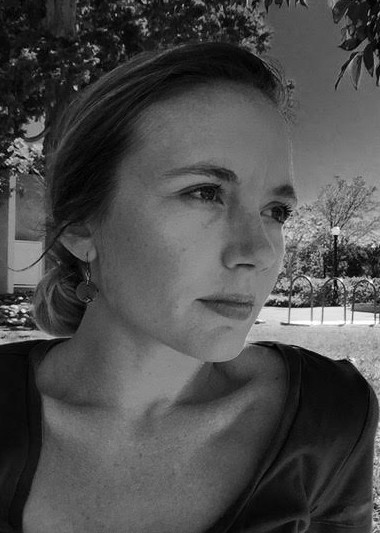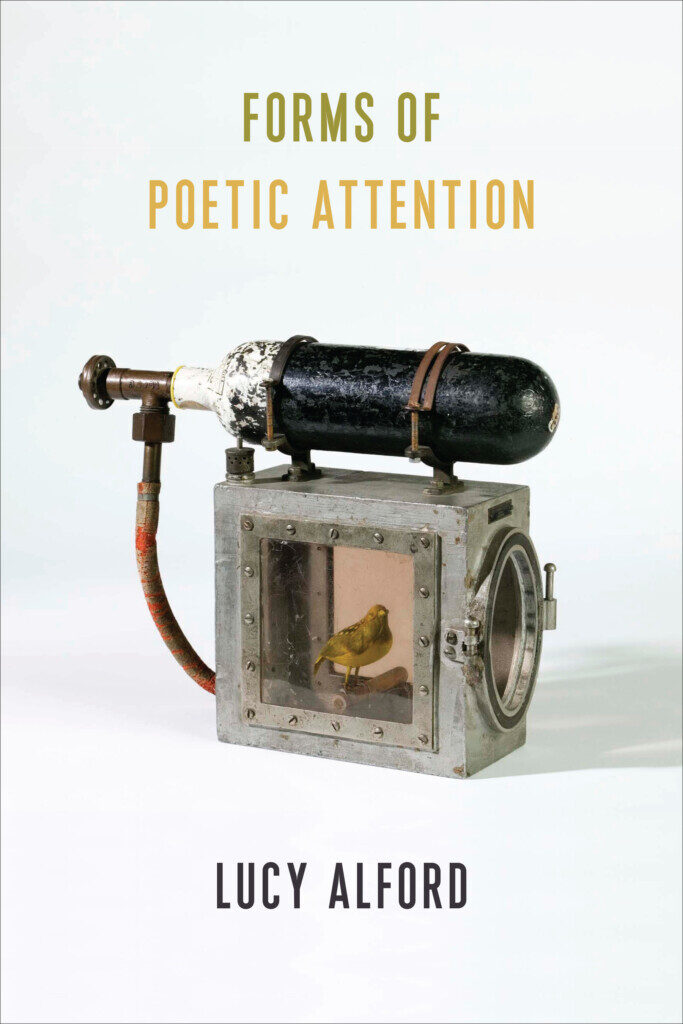Lucy Alford
Associate Professor, Literature
Contact
- Office: Tribble C312
- Phone: (336) 758-2240
- Email: alfordl@wfu.edu
Degrees
- PhD, Comparative Literature, Stanford University, 2016
- PhD, Modern Thought, University of Aberdeen, 2011
- MLitt by Research, University of Aberdeen, 2008
- BA, University of Virginia, 2005

Lucy Alford specializes in twentieth and twenty-first century American poetry and poetics, as well as transnational and trans-historical poetries in English, French, German, and Arabic. As both a practicing poet and teacher of poetry, Alford is particularly interested in sensory life, experimentation, and the roles of habit, constraint, and play in creative processes. Her research and teaching center on poetry’s intersections with lived, attentive experience. Her work investigates the object, act, and event of literature as a site of complex ethical and epistemological dynamics, and the relationships between poetry and other media such as music, dance, film, and the visual arts.

Alford’s first book, Forms of Poetic Attention (Columbia UP, 2020), examines the forms of attention both required and produced in poetic language, bringing both philosophical and cognitive inquiry into conversation with the inner workings of specific poems. Forms of Poetic Attention makes the claim that poetry’s primary medium is attention, and that the forms of attention demanded by poetry can train, hone, and refine our capacities for perception and judgment, on and off the page. Chapters constellate readings of modern and contemporary American poets such as Emily Dickinson, Frank O’Hara, Anne Carson, and Claudia Rankine with those of earlier and nonwestern poets to explore modes of attention such as contemplation, desire, recollection, vigilance, and boredom across historical contexts.
Her second scholarly project, Vital Signs, considers trans-historical elements of poetic form (line, meter, stanza) in terms of the human vital signs and vital needs (breath, pulse, shelter)—as signs of life and forms of sustenance amid contemporary conditions of political and environmental precarity. Central poets in this project include Gwendolyn Brooks, Theresa Hak Kyung Cha, Cecilia Vicuña, and Nathaniel Mackey.
Areas of Interest:
- 20th & 21st Century American Poetry
- Comparative Poetics
- Literature & The Mind
- Race, Class, & Gender
- Ecological Poetics
Courses at Wake Forest:
- ENG 758: Salvage Poetics
- ENG 389: Eight: Black Poetry and the Pulitzer Prize
- ENG 385/685: 20/21C American Poetry: Politics, Identity, Change
- ENG 344: American Sonnets
- ENG 150: Women Writing War
- ENG 150: Writing in the Ruins of the Future
Selected Publications:
Book:
- Alford, Lucy. Forms of Poetic Attention. New York: Columbia University Press, January 2020.
- Alford, Lucy. Daylight / Savings. Poetry. Black Square Editions, Forthcoming, 2026.
Journal Articles:
- Alford, Lucy. “Language, Terrain, Aftermath: Paul Celan and Cormac McCarthy” Paideuma 51,Symposium on Poems and Places (forthcoming, 2026).
- Alford, Lucy. “A Precarity Poetics: Conditions and Praxis in Contemporary Criticism.” American Literary History37, Summer 2025: 449–467.
- Alford, Lucy. “Suspension Bridges: The Poetics of Relation in Nathaniel Mackey’s Splay Anthem.” MLN In 135, Dec 2020, Comparative Literature Issue, 1258-1282.
- Alford, Lucy. “Full / Of Endless Distances: Forms of Desire in Poetic Attention.” Dibur 2, Special Issue on Form. Spring 2016.
- Alford, Lucy. “We Know it in our Bones: Reading a Thirty-Five-Acre Plot in Rural Virginia with Three Poems by Charles Wright.” Philosophy & Literature 39. April 2015: 219-232.
Chapters in Edited Volumes:
- Alford, Lucy. “Form as Precarious Shelter: Gwendolyn Brooks’s In the Mecca.” In Sarah Nooter and Mario Telò, eds., Radical Formalism. Bloomsbury Press, 2024.
- Alford, Lucy. “Self-Portraits in a Convex Mirror: The Essay in American Poetry.” In Jason Childs and Christy Wampole, eds., The Cambridge History of the American Essay. Cambridge University Press, 2024.
- Alford, Lucy. “Units of Intensive Care: Poetic Attention and the Precarious Body.” In D. Graham Burnett and Justin E. Smith, eds. Scenes of Attention: Essays on the Mind, Time, and the Senses. Princeton University Press, 2023.
Poetry:
- Alford, Lucy. “Solstice Rites.” FENCE, Fall 2022.
- Alford, Lucy. “To See the World Before the End of the Earth”; “Now, Here”; “Autumn, Killing Time.” Action, Spectacle March 2021.
- Alford, Lucy. “Grass Crossing,” “Worry Word,” and “Fire Escaping.” Mantis 18,New Poetry Section, December 2020.
- Alford, Lucy. “Periwinkle.” Literary Matters 11.1 Fall 2018.
- Alford, Lucy. “Ferment.” Streetlight Magazine Winter 2018.
- Alford, Lucy. “Unforgivable Elegy,” “Drifts,” and “Fallow.” Atalier: Gli artigiani della parola. Italian translations by Anna Tomasetto. Online: http://www.atelierpoesia.it/portal/en/poetry-mul/poetry-in-translation-mul/item/467-lucy-maddux-alford-tre-inediti.
- Alford, Lucy. “Ghazal in Glass.” Harpur Palate 3 Winter and Spring 2015: 1.
- Alford, Lucy. “Oysters.” The Warwick Review 2:3 “New American Writing” September 2008: 34.
Short Essays & Reviews:
- Alford, Lucy. “Broken Lyrics: Forms of Survival and the Survival of Form in Darwish, Mackey, and Rankine.” Mantis 18, December 2020. Special Issue: The Embodied Mind.
- Alford, Lucy. “The Poet’s Freedom: A Notebook on Making by Susan Stewart.” MLN: Modern Language Notes127. December 2012: 1267-1271.
- Alford, Lucy. “Territories of Undetermined Permanent Status: Reading Mourid Barghouti’s Midnight.” The Warwick Review. 3.1. 2009: 81-85.
- Alford, Lucy. “The Distance from Birds to Jerusalem: Fady Joudah’s The Earth in the Attic.” The Warwick Review.2:3(2008): 34-35.
- Alford, Lucy. “Radically Human: Darwish’s The Butterfly’s Burden and Muhammad Ali’s So What.” The Warwick Review. 2.1. 2008: 9-14.
Awards:
- Helen Tartar First Book Subvention Award, American Comparative Literature Association
- Geballe Dissertation Prize Fellowship, Stanford University
- Ric Weiland Fellowship, Stanford University
- International Research Fellowship, Dahlem Humanities Center, Freie Universität, Berlin
- Graduate Research Opportunities Award, Stanford University
- Abbasi Student Research Grant, Stanford University
- Sixth Century Scholars Award, University of Aberdeen
